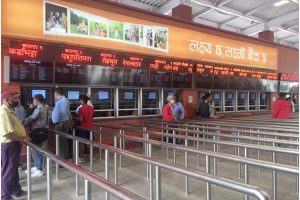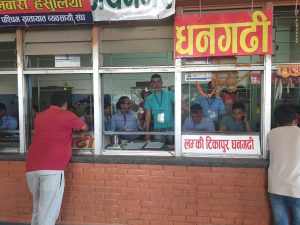
The Covid-19 public health emergency has already become a global crisis and the countries have imposed national emergency, restrictions on travel, including stop-movement orders. This pandemic has placed unprecedented pressure on our health and social systems. Frontline service providers and systems, such as health, policing and social welfare, are overwhelmed by a plethora of activities related to preparedness and response of the Covid-19 pandemic. The major efforts of the entire health system and workforce are directed towards containing the spread of the disease and often the resources are diverted from the routine health services.
In doing so, there is a risk that essential health services that the communities expect from the system would be compromised. Many essential services have been deferred because of the lockdown and physical distancing requirements coupled with the fear of Covid-19 exposure. Nepal has been under lockdown since March 24. With no clear plan about going back to the normal life, the end to the lockdown is still not clear.
One of the most profound impacts of Covid-19 has been on the lives of women and girls. The lockdown and quarantine measures imposed to curb the spread of the virus have put millions of women around the world out of reach of birth control options and other sexual and reproductive health (SRH) services. Confined in homes with their partners, they are much at risk to face unwanted or unplanned pregnancies. Because of the travel bans and closure of many clinics and health facilities, women are less able to access critical SRH services such as maternal health care, contraceptives and family planning, abortion, screening, and treatment of STIs and other services.
For women using long-acting reversible contraceptives such as implants and intrauterine devices, there might be a need for replacement, re-insertion, or switching to another method due to side effects, complications or completion of duration. Even for those using short-term methods such as oral contraceptive pills and condoms, going out to procure a contraceptive is relatively difficult. In both cases, as the services are unavailable, more women are likely to experience unplanned pregnancies.
 Some women may opt for abortion and many of these could turn out to be unsafe as the crisis could push women to take abortion drugs without the supervision of the health workers. Women also face greater exposure and vulnerability to gender-based violence and other harmful practices as they have been obliged to spend long hours at home with abusers, and with limited options for seeking help and support. This is especially problematic for women and girls from hard-to-reach areas including marginalised groups and those with disabilities.
Some women may opt for abortion and many of these could turn out to be unsafe as the crisis could push women to take abortion drugs without the supervision of the health workers. Women also face greater exposure and vulnerability to gender-based violence and other harmful practices as they have been obliged to spend long hours at home with abusers, and with limited options for seeking help and support. This is especially problematic for women and girls from hard-to-reach areas including marginalised groups and those with disabilities.
Even in places where health services are available, many women refrain from visiting health facilities as they fear being beaten by security forces and accused of defying the lockdown. Although the government has long ago declared that the people seeking essential services would be allowed to commute freely, there is no public transportation available. On the other hand, due to shyness and fear of stigmatisation, women, often, might not be in a state to openly disclose the reasons to the security forces who impede their movement on the way to health centres. Nonetheless, many women prefer to seek family planning, abortion, or other reproductive health services clandestinely from the health centers which are typically away from their residence.
Meanwhile, outreach services, the key to reaching rural women and others furthest behind, have largely been suspended to avoid crowds and to prevent the risk of virus transmission from one community to another. The Covid-19 pandemic has also led to disruptions in supply chains across sectors, including contraceptives and essential medical supplies.
Why should it matter?
 A recent estimate from a Guttmacher institute revealed that even a 10% decline in contraceptive use in low- and middle-income countries due to reduced access would result in an additional 49 million women with an unmet need for modern contraceptives and an additional 15 million unintended pregnancies over the course of a year. The institute has also predicted that even a modest decline of 10% coverage of pregnancy-related and newborn healthcare would have disastrous implications for the lives of women and their newborns.
A recent estimate from a Guttmacher institute revealed that even a 10% decline in contraceptive use in low- and middle-income countries due to reduced access would result in an additional 49 million women with an unmet need for modern contraceptives and an additional 15 million unintended pregnancies over the course of a year. The institute has also predicted that even a modest decline of 10% coverage of pregnancy-related and newborn healthcare would have disastrous implications for the lives of women and their newborns.
An additional 1.7 million women who give birth and 2.6 million newborns would experience major health complications but would not receive the care they need resulting in an additional 28,000 maternal deaths and 168,000 newborn deaths. Similarly, the estimates say that if 10% of safe abortions become unsafe because women cannot access safe abortion services amid lockdowns and clinic closures, there would be an increase of three million unsafe abortions and one thousand more maternal deaths in the low and middle-income countries.
On the other hand, the United Nations Population Fund estimates that 23 million women in 114 low and middle-income countries may not be able to access modern contraceptives and 600,000 unintended pregnancies are expected to occur if the lockdown continues for three months with medium disruptions in health services. In the same period, 31 million additional cases of gender-based violence can be expected to occur. It is, therefore, clear that the consequences could be severely catastrophic for women and their families if critical sexual and reproductive health services are reduced or suspended during the pandemic.
The access to reproductive health services is always sensitive and potentially life-saving and should not be deferred given any circumstances including the Covid-19 lockdown.
What can be done?
 It is not logical to protect the people from Covid-19 and yet expose them to other fatalities against which the government and other partners have made substantial investments over several years. So, the answer is clear and obvious: despite the lockdown and travel bans, it is imperative that the critical sexual and reproductive health services should be continued and made accessible to everyone without having to face barriers of any kind.
It is not logical to protect the people from Covid-19 and yet expose them to other fatalities against which the government and other partners have made substantial investments over several years. So, the answer is clear and obvious: despite the lockdown and travel bans, it is imperative that the critical sexual and reproductive health services should be continued and made accessible to everyone without having to face barriers of any kind.
The Covid-19 pandemic has been a severe stress-test for all of us. The existing health system is overstretched and preoccupied with preparedness and response activities. Despite these challenges, the health system should not depart itself from exploring innovative models and approaches of care. Given that the stringent lockdown and travel restriction measures are currently in place, asking women to visit health centres for the services they need might not be both practical and ethical, for many reasons. It is therefore imperative for a health system to adopt alternative models of outreach services in order to cater to women at places near their doorsteps.
One approach is to revitalise and reposition the role of visiting service providers who are often found very effective in increasing the uptake of contraceptives. Although these service providers are currently available in more than 50 districts, most remote and hard-to-reach, activities of the majority have been suspended greatly ever since the beginning of the lockdown. It is a stark reality that these cadres are barely utilised during this crisis.
In addition, taking into account the local availability of human resources and current pressures on the health system, the local governments and health system authorities may also decide to mobilise other public healthcare workers (both nurses and paramedics) at peripheral levels to offer SRH and other critical health services in the outreach.
These visiting providers could plan a fixed service day for each village/ward area and organise comprehensive family planning, sexual and reproductive health outreach sessions. Such kinds of sessions could be planned on dates and time decided locally based on demands from the community. The beneficiaries may be called in a small group of three to four persons per session to ensure adherence to physical distancing. The existing community networks such as female community health volunteers, local health workers, and social mobilisers might be utilised to identify and communicate about outreach services to women and girls with a need for services, and this could possibly be done through the telephone or local contacts.
 Such home visits and outreach services should preferably be linked to temporarily established helpline/hotline services such that needs for additional support and referrals can be responded to immediately.
Such home visits and outreach services should preferably be linked to temporarily established helpline/hotline services such that needs for additional support and referrals can be responded to immediately.
Besides, offering family planning services to postpartum women through infant immunisation contacts has been considered one of the promising high-impact practices in family planning. Given the need for a health system to work efficiently by minimising the frequency of people’s contacts, the opportunities could be explored to cater both, the infants for immunisation and the mothers for family planning and/or SRH services.
Ensuring the uninterrupted supply of contraceptives and birth control pills and other essential commodities is another critical aspect to safeguard people’s access to sexual and reproductive health services. In rural communities, where reaching health facilities or private pharmacies could be a problem due to travel restrictions, different alternatives could be considered for increasing people’s access to contraceptives.
One approach is to explore whether it would be feasible to make the short-term contraceptives such as condoms and pills available at local grocery stores. Amid the lockdown, the grocery shops remain open each day, even if it is for certain hours in a day and are often accessible to everyone. The local governments may appoint a local youth volunteer to fetch contraceptive supplies from district/municipal stores or health facilities up to these distribution points.
It is also critically important to make the best use of existing digital and tele-health platforms to ensure the provision of reproductive health information, counselling, and services. Digital platforms have become more popular, safer, and effective means to reach clients with comprehensive and reliable information and services during this lockdown.
 A number of toll-free helpline facilities are available for sexual and reproductive health services in Nepal. For instance, Meri Saathi has been offering information, counseling, and referrals on sexual and reproductive health issues through dedicated counsellors. Also, there are other hotline services and mobile health platforms operated by a few other NGOs and the Ministry of Health and Population. In addition, a 24-hour hotline service operated by the National Women Commission offers support to gender-based violence survivors.
A number of toll-free helpline facilities are available for sexual and reproductive health services in Nepal. For instance, Meri Saathi has been offering information, counseling, and referrals on sexual and reproductive health issues through dedicated counsellors. Also, there are other hotline services and mobile health platforms operated by a few other NGOs and the Ministry of Health and Population. In addition, a 24-hour hotline service operated by the National Women Commission offers support to gender-based violence survivors.
Such hotline service can respond promptly during emergencies and offer referral services to women to receive health services, legal aid, psychosocial support, child support, and safe shelter. Clients requiring any type of information and support services should, therefore, be encouraged to utilise these tele-platforms to obtain comprehensive information, identify a need to visit a health facility/hospital and to determine whether referral services are needed. Mass media could be used to inform the public about its availability, to build public trust that these services are confidential and reliable.
Having considered all these approaches, the government and health systems must be thoughtful about a few other basic issues. Firstly, wherever feasible, the intermediate means of transportation such as bicycles, scooters, or other local means could be provisionally made available to these providers to enable their movements to distant or hard-to-reach areas. Secondly, the protection of visiting service providers is crucially important. Thus, it is imperative that these nurses and healthcare providers are well-informed and orientated on the standard protocols for infection prevention and control and are aware of the advisories for infection prevention, personal protection, and physical distancing norms.
Lastly, the key to successful pandemic response and continuity of essential health services largely depends on how robustly the governments and health system apply their efforts and resources and how effectively the coordination has been sustained with other private and nongovernment sectors at the local level.
For universal access to sexual and reproductive health services to become a reality, there is an urgent need for concerted efforts, quick and decisive action. It is the responsibility of everyone including the public health sector, the governments at all three tiers, and for-profit as well as not-for-profit sectors to devise necessary measures. While the Covid-19 pandemic is inevitable, the devastating impacts of the lockdown on SRH services can be significantly mitigated if the community-level efforts are well-integrated.
Ghimire is a public health worker focused on sexual and reproductive health services.
























